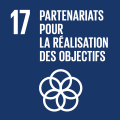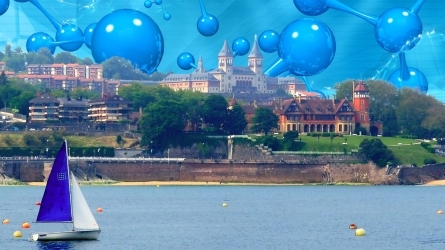
One Health en acción: estrategias multidisciplinares para un desarrollo sostenible
Este Curso se va a desarrollar en la intersección entre la Salud Global (humana, animal, ambiental y económica) y los objetivos de desarrollo sostenible. Trabajaremos cómo enfrentar retos complejos e interconectados con soluciones accionables y sostenibles.
Description
La Salud Global es un concepto que se desarrolló para combatir las desigualdades en salud a nivel mundial, fomentar liderazgos en países en desarrollo y aplicar enfoques interdisciplinarios, como respuesta a la globalización económica y la influencia de instituciones financieras en la salud pública.
La OMS estima que entre 2030 y 2050, se espera que el cambio climático cause aproximadamente 250 000 muertes adicionales por año en todo el mundo. Los impactos del cambio climático en la salud son diversos y pueden incluir no solo efectos directos (por ejemplo, fenómenos meteorológicos extremos como sequías, grandes incendios o inundaciones) sino también efectos indirectos (como cambios en los patrones de enfermedades, seguridad alimentaria y disponibilidad de agua).
Aunque nos encontramos ante un fenómeno global, que afecta a la salud humana, animal y medioambiental, las poblaciones vulnerables se ven especialmente afectadas; para abordar los desafíos globales y promover el desarrollo sostenible, se crearon, en 2015, los Objetivos de Desarrollo Sostenible (ODS). Sus metas son erradicar la pobreza, garantizar la inclusión social, promover la sostenibilidad ambiental y fomentar el desarrollo económico a escala global para 2030. Los 17 objetivos abarcan una amplia gama de cuestiones interconectadas, incluidas la pobreza, el hambre, la salud, la educación, igualdad de género, agua potable, acción climática y asociaciones para el desarrollo sostenible.
Estos ODS nos proporcionan un marco integral para la cooperación y la acción internacionales y para crear un mundo más equitativo, resiliente y sostenible. Comprender y abordar los desafíos de salud desde este punto de vista integrado puede conducir a soluciones más efectivas y sostenibles.
Así, este Curso de Verano pretende abordar los desafíos de Salud Global, alineando el abordaje de estos retos con el cumplimiento de los Objetivos de Desarrollo Sostenible y todo ello desde una perspectiva científica, colaborativa y orientada a hacer comprender la interconexión entre la salud humana, animal y ambiental al alumnado universitario, a profesionales relacionados con la Salud Global así como a agentes implicados en tomas de decisiones a nivel local, regional o internacional.
Objectives
Salud Global: todo está conectado. Transmitir la noción de que la salud de personas, animales, medioambiente y economía están interconectados de una manera indivisible y todo lo que impacta en una de estas variables impacta en las demás.
Retos de la Salud Global: Sensibilizar acerca de los retos que entraña el futuro de la salud global y cómo abordarlos a partir de los Objetivos de Desarrollo Sostenible para aportar soluciones a estos problemas.
Percepción de problemas: Conocer la forma en que las personas percibimos los problemas derivados de una deficiente información científica con respecto a la salud global, para evitar la desinformación y la inacción, especialmente en un momento en el que la IA y los bulos parece que se están apoderando de parte de la información.
Papel de la Ciencia: Valorar el papel de la ciencia, como sistema de conocimiento riguroso, ante los factores que determinan la salud global.
Activity directed to
- All public
- University student
- Students not from university
- Teachers
- Professionals
- Policy makers
Program
11-07-2024
Registro
Presentation by the Director of the activity
- Cristina Juesas Escudero | CJ Comunicación - Consultora
“Agua: la importancia de la contaminación “
- Gorka Orive Arroyo | UPV/EHU - Catedrático
- Unax Lertxundi Etxebarria | Osakidetza - Jefe de Sección de Farmacia. Red de Salud Mental Araba.
“Una visión de la salud global desde la filosofía económica“
- Armando Menéndez Viso | Universidad de Oviedo - Profesor titular
Break
“Salud Global: qué tiene la IA que decir a esto“
- Susana Pérez Sánchez | Tecnalia - Directora de Smart Industry
Round table: “Coloquio abierto“
- Armando Menéndez Viso | Universidad de Oviedo - Profesor Titular
- Juan Oregui Oregui | Bankinter - Asesor de banca privada
- Susana Pérez Sánchez | Tecnalia - Directora de Smart Industry
- Gorka Orive Arroyo | UPV/EHU - Catedrático
- Cristina Juesas Escudero | CJ Comunicación - Consultora
“Crecer o decrecer: esta es la cuestión“
- Juan Oregui Oregui | Bankinter - Asesor de banca privada
“Dinámica: la comunicación en Salud Global“
- Cristina Juesas Escudero | CJ Comunicación - Consultora
Synthesis
12-07-2024
“¿Para que vale la naturaleza? Una visión integral desde los múltiples valores de la naturaleza para la salud“
- Unai Pascual | BC3 - Investigador
“Preparando las ciudades para una mejor salud global“
- Marta Sola Páramo | Lekustudio - Arquitecta
Break
“El fin de la energía tal y como la conocemos“
- Antonio Turiel | Instituto de Ciencias del Mar - Investigador
Round table: “Coloquio abierto“
- Unai Pascual | BC3 - Investigador
- Marta Sola Páramo | Lekustudio - Arquitecta
- Antonio Turiel | Instituto de Ciencias del Mar - Investigador
- Rosario Melero Alcíbar | Salud Madrid - Entomóloga
- Cristina Juesas Escudero | CJ Comunicación - Consultora
“Vectores: una mirada desde la convivencia“
- Rosario Melero Alcíbar | Salud Madrid - Entomóloga
“Dinámica: Propuestas para mejorar la salud global“
- ignacio Garitano gutiérrez | Bioaraba - Adjunto a la Dirección Científica
Closing session
- Cristina Juesas Escudero | CJ Comunicación - Consultora
Directors
Communications consultant. Graduate in Tourism with a postgraduate degree in quality (Escuela Oficial de Turismo). Expert in Science Communication by the UNED. She has been organizing TEDxVitoriaGasteiz since 2015. Co-author of Hablar en público en cuatro pasos: un método basado en el viaje del héroe (Libros de Cabecera, 2021). Associate Professor at DigiPen Institute of Technology Bilbao. She has been a lecturer at the Basque Culinary Center (University of Mondragón) and teaches public speaking in the Master's Degree in Access to the Legal Profession and Procurement at the University of Deusto. She was internet communication advisor in the Basque Government and Communications Manager of Euskampus Fundazioa during the Campus of International Excellence project (2012-2015). Author of the guides of use and style in social networks of the Basque Government and the University of the Basque Country. Member of Toastmasters International, with 2 DTMs, she has been District 107 Director (Spain, Portugal and Morocco). Communications Manager at Foundation iO, devoted to projects in Global Health, infectious diseases and travel medicine. She has coordinated the book Curiosidades sobre las enfermedades infeccioesas (2021).
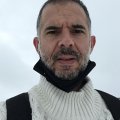
ignacio Garitano gutiérrez
Hospital Universitario Araba
I am a family physician with interest in tropical medicine and international health as well as humanitarian aid. I worked in several missions in Africa with Medecins Sans Frontieres (MSF); I became epidemiologist performing the European Programme of Intervention Epidemiology Training with the ECDC and studying an online MSc in Epidemiology with the London School of Hygiene and Tropical Medicine. I worked for one year in South Africa as epidemiologist for MSF. Afterwards I became a gynaecologist and obstetrician. After 6 years practice, the SARS-CoV-2 Pandemic made me work as epidemiologist again in surveillance for the Basque Government. Currently I am the deputy of the Scientific Director of Bioaraba Health Reserch Institute in Vitoria-Gasteiz, Basque Country, Spain
Speakers

ignacio Garitano gutiérrez
Hospital Universitario Araba
I am a family physician with interest in tropical medicine and international health as well as humanitarian aid. I worked in several missions in Africa with Medecins Sans Frontieres (MSF); I became epidemiologist performing the European Programme of Intervention Epidemiology Training with the ECDC and studying an online MSc in Epidemiology with the London School of Hygiene and Tropical Medicine. I worked for one year in South Africa as epidemiologist for MSF. Afterwards I became a gynaecologist and obstetrician. After 6 years practice, the SARS-CoV-2 Pandemic made me work as epidemiologist again in surveillance for the Basque Government. Currently I am the deputy of the Scientific Director of Bioaraba Health Reserch Institute in Vitoria-Gasteiz, Basque Country, Spain
Communications consultant. Graduate in Tourism with a postgraduate degree in quality (Escuela Oficial de Turismo). Expert in Science Communication by the UNED. She has been organizing TEDxVitoriaGasteiz since 2015. Co-author of Hablar en público en cuatro pasos: un método basado en el viaje del héroe (Libros de Cabecera, 2021). Associate Professor at DigiPen Institute of Technology Bilbao. She has been a lecturer at the Basque Culinary Center (University of Mondragón) and teaches public speaking in the Master's Degree in Access to the Legal Profession and Procurement at the University of Deusto. She was internet communication advisor in the Basque Government and Communications Manager of Euskampus Fundazioa during the Campus of International Excellence project (2012-2015). Author of the guides of use and style in social networks of the Basque Government and the University of the Basque Country. Member of Toastmasters International, with 2 DTMs, she has been District 107 Director (Spain, Portugal and Morocco). Communications Manager at Foundation iO, devoted to projects in Global Health, infectious diseases and travel medicine. She has coordinated the book Curiosidades sobre las enfermedades infeccioesas (2021).
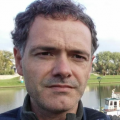
Unax Lertxundi Etxebarria
Osakidetza, Doctor en Farmacia
Unax Lertxundi works as Head of the Pharmacy Section in the Araba Mental Health Network, part of Osakidetza, the Basque Health Service. In 2002 he came first in the national entrance examination for FIR, or Resident In-House Pharmacists. Holder of a doctorate in Pharmacy from the University of the Basque Country (special prize-winner), he has led and taken part in numerous research projects, and is the author of more than 60 articles in international academic journals and 60 conference papers, having won numerous awards. He is also one of 16 European professionals to be a Board Certified Psychiatric Pharmacy (BCPP) specialist, awarded by the prestigious American Pharmacists Association.
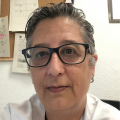
Rosario Melero Alcíbar
CU SAIUS
Dra. Rosario Melero Alcíbar, Doctora en Biología y doctora en Didáctica de las ciencias; Enfermera. Especialista en Entomología Sanitaria, área en la que llevo desde hace más de 25 años investigando y formando a profesionales, sobre la interacción de los artrópodos y la salud pública. Desde 2019 ejerciendo de enfermera asistencial rural para el SERMAS, que compatibiliza con labores docentes de posgrado en el Centro Universitario SAIUS.

Armando Menéndez Viso
Doctor en filosofía y licenciado en economía. En la actualidad ejerce como profesor en el Departamento de Filosofía de la Universidad de Oviedo. Ha dedicado una buena parte de su trabajo académico a las relaciones entre ciencia y sociedad, la innovación y la sosteniblidad.
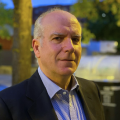
Juan Oregui Oregui
Licenciado en Derecho por la Universidad de Deusto. Titulación European Financial Advisor (EFA). Tras una larga trayectoria en Banca de Inversión, en la actualidad trabaja como agente libre para clientes de banca personal y privada en Bankinter.
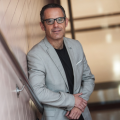
Gorka Orive Arroyo
UPV/EHU, Doctor en Farmacia
Doctor Gorka Oriva, aged 44, is a prolific, multi-faceted pharmacy lecturer, researcher, teacher, educator and entrepreneur. He takes part in a range of research projects. His academic output is outstanding, including a total of 318 international publications, 45 in Spain, 25 book chapters and 3 books as principal editor. He has an h-index of 70 and over 18,400 citations. His academic output is over 20 international articles a year over the last 10 years. He is in the top 1% of scientists by h-index in a sample of 55,000 in Spain. Moreover, in the recent “Top Scientific Rankings” drawn up by Stanford University, he heads the list of the most influential pharmaceutical researchers in Spain, and is one of the top 30 scientists in the world in this category, counting those still working who published their first article in the 21st century. He is founder and CSO of the firm Geroa Diagnostics.
Unai Pascual
Basque Centre for Climate Change (BC3)
Unai Pascual (BC3) es profesor del Centro de Investigación Ikerbasque y tiene más de 20 años de experiencia en el campo de la economía ecologista, adquiriendo ciencias sociales y naturales para entender sistemas socioculturales complejos. Es miembro del Panel Multidiscipline Expert de los Servicios de Biodiversidad y Ecosociología (IPBES). Sus principales investigaciones se centran en la interacción entre el cambio global del medio ambiente y la economía, con especial atención al papel evolutivo de las instituciones, los mercados y la gobernanza ambiental a lo largo de las balanzas. Ha realizado proyectos de investigación en países de todo el mundo como varios de Europa, EEUU, México, Perú, Bolivia, Colombia, India, Etiopía y Malawi. Pascual ha trabajado como profesor y profesor principal en varias universidades europeas (Cambridge, Manchester, York, Barcelona, Bilbao) y Latinoamérica (Argentina, República Dominicana, México, Colombia).

Susana Pérez Sánchez
Master en Ciencias de la Computación e Ingeniera de Telecomunicación por la Universidad de Deusto. Ha trabajado en Telefónica I+D y dirigido la cátedra Movistar en la Universidad de Deusto durante sus años como profesora en las Ingenierías Informática y de Telecomunicación. Su experiencia comprende áreas como la Internet del Futuro, Internet de las cosas, redes y protocolos inalámbricos y tecnologías de digitalización industrial. Ha dirigido proyectos de I+D durante más de 15 años en Tecnalia y ha sido la directora de Smart Industry, área de negocio focalizada en las tecnologías habilitadoras para Industria 4.0: sensórica avanzada, visión artificial, mantenimiento y aplicación de Inteligencia Artificial en procesos productivos, buscando KPIs de mejora de calidad, optimización de la producción, eficiencia y sostenibilidad.

Antonio Turiel
Antonio Turiel (León, 1970) es Licenciado en Físicas (1993), Licenciado en Matemátcias (1994) y Doctor en Física Teórica (1998), todas ellas por la Universidad Autónoma de Madrid. Es Investigador Científico del CSIC con destino en el Instituto de Ciencias del Mar de Barcelona. Autor de más de 95 artículos científicos publicados en revistas científicas internacionales, la mayoría de ellos centrados en la oceanografía, el impacto del océano en el clima y los recursos naturales. Su blog, The Oil Crash, con más de 14 millones de páginas vistas, es una referencia en castellano sobre los problemas de sostenibildiad de nuestra sociedad y particularmente sobre el agotamiento de los combustibles fósiles. Sus dos últimos libros de divulgación son "Petrocalipsis: crisis energética global y cómo (no) la vamos a solucionar" y "El Otoño de la Civilización" (con Juan Bordera)
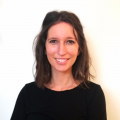
Marta Sola Páramo
Arquitecta por la Escuela Técnica Superior de Arquitectura de Barcelona, 2015. Antes de fundar Leku Studio, colaboró con diferentes estudios de carácter internacional participando en proyectos de arquitectura y masterplan en ciudades como Doha, Tánger y Londres. Especializada en el diseño de proyectos y estrategias de transformación urbana, es a su vez codirectora y responsable del programa cultural del festival de arquitectura Open House Bilbao.
Summary
Conclusions sent by the direction of the Summer Course
Sustainable development goals
Agenda 2030 is the new international development agenda approved in September 2015 by the United Nations. This agenda aims to be an instrument to favour sustainable human development all over the planet, and its main pillars are the eradication of poverty, a reduction in equality and vulnerability and fostering sustainability. It is a unique opportunity to transform the world up to 2030 and guarantee human rights for all.

3 - Good health and well-being
Guarantee a healthy life and foster the well-being of all people of all ages. Key issues: universal healthcare coverage, sexual and reproductive health, reduction in the number of road accident casualties, pollution and chemical products, reduction in maternal and neonatal mortality, the end of epidemics such as AIDS, combating hepatitis and other water-borne diseases, drug and alcohol prevention, control of tobacco.
More information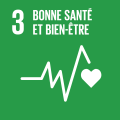
4 - Quality education
Guarantee quality education that is inclusive and equitable and foster opportunities for lifelong learning for everyone. Key issues: free-of-charge, equitable and quality education, access to higher education and training on an equal basis, education for sustainable development, suitable education centres for persons with disabilities, and safe, non-violent and efficient learning environments.
More information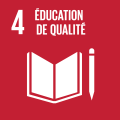
5 - Gender equality
Achieve gender equality and empower all women and young girls. Key issues: the end of all forms of discrimination and violence, recognition of unpaid care and domestic work, shared responsibility, equal opportunities, full and effective participation in reproductive rights, equal rights vis-à-vis economic resources, access to land and other assets and ownership.
More information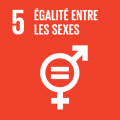
6 - Clean water and sanitation
Guaranteeing the availability and sustainable management of water and sanitation for everyone. Key issues: universal and fair access at an affordable price, access to sanitation and hygiene services, water quality, efficient use of water resources, end-to-end management, protection of water ecosystems, reduction of pollution, elimination of waste discharges, wastewater treatment.
More information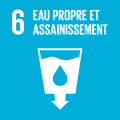
7 - Affordable and clean energy
Guaranteeing access to affordable, reliable, sustainable and modern energy for everyone. Key issues: universal access, increased proportion of clean energies, energy efficiency, research, fostering investments in energy infrastructures and clean technologies, modern and sustainable energy services.
More information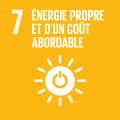
8 - Decent work and economic growth
Foster sustained, inclusive and sustainable economic growth, full and productive employment and decent work for everyone. Key issues: decent work, full and productive employment, entrepreneurship, fostering micro-companies and SMEs, employment rights, safe working environments, youth employment, equal opportunities and pay, strengthening of financial institutions, and breaking the link between economic growth and the degradation of the environment.
More information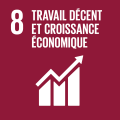
9 - Industry, innovation and infrastructure
Build resilient infrastructures, promote inclusive and sustainable industrialisation and foster innovation. Key issues: reliable, sustainable, resilient and quality infrastructures, inclusive and sustainable industrialisation, modernisation, clean and environmentally rational industrial technologies and processes, scientific research and improvement of technological capabilities, universal access to ICTs.
More information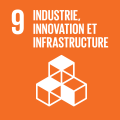
10 - Reduced inequalities
Reduce inequality in countries and between them. Key issues: promotion of the social, economic and political inclusion of all people, equal opportunities, fiscal, wage and social protection policies to favour equality, migration and the policies that affect it, official assistance for the development, regulation and supervision of world institutions and markets.
More information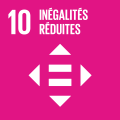
11 - Sustainable cities and communities
Make cities and other human settlements inclusive, safe, resilient and sustainable. Key issues: access to suitable housing and basic services that are secure and affordable, suitable and sustainable transport systems, inclusive urban planning, participative planning and management, protection of cultural and natural heritage, air-quality, green zones, and connections between urban, peri-urban and rural areas.
More information
12 - Responsible consumption and production
Guarantee sustainable modalities of consumption and production. Key issues: sustainable management and efficient use of natural resources, reduction of chemical particles released to the atmosphere, water and soils, reduction of waste products, recycling, reuse and reduction, sustainable practices, sustainable public procurement, sustainable lifestyles, rationalisation of inefficient subsidies for fossil fuels.
More information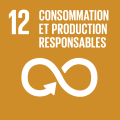
13 - Climate action
Adopt urgent measures to combat climate change and its effects. Key issues: mitigation, resilience and capacity for adaptation, planning, national strategies and plans, education and raising awareness, reduction of effects and early warning systems, compliance with the Framework Convention of the United Nations on Climate Change.
More information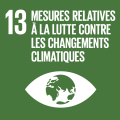
14 - Life below water
Conserve and sustainably use the oceans, seas and marine resources for sustainable development. Key issues: reduction of marine pollution and acidification of the oceans, protection of marine ecosystems, re-establishment of the health and productivity of the oceans, conservation de coastal and marine areas, elimination of over-fishing and poaching, support for traditional fishing, increased scientific knowledge.
More information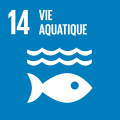
15 - Life on land
Protect, establish and foster the sustainable use of terrestrial ecosystems, manage forests sustainably, fight desertification, hold back and reverse the degradation of land and delay the loss of biodiversity. Key issues: the fight against desertification, reforestation, conservation, the regeneration and sustainable use of terrestrial ecosystems, natural habitats, biodiversity, invasive exotic species, integration of the values of ecosystems into planning, poaching.
More information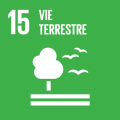
17 - Partnerships for the goals
Strengthen the means of implementation and revitalise the World Alliance for Sustainable Development. Key issues: mobilisation of resources, 0.7% of GDP for official overseas development aid, finances, cooperation in technology and innovation, ecologically rational technologies, skills building, universal and multilateral trade system, coherence on the legislative and institutional levels, availability of data, supervision, indicators and accountability.
More information